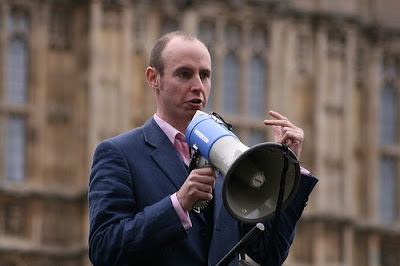
MEP and internet superstar, Daniel Hannan is up in arms at what he sees Barack Obama sucking up to ‘Peronist Argentina’ on the Falklands.
“When matters last came to a head,” he writes, “Ronald Reagan had no difficulty backing Margaret Thatcher: the Gipper knew who America’s friends were.”
Of course, it wasn’t nearly as simple as that, as I am sure Hannan (a huge Thatcher fan) knows well. Michael Moynihan (no foe of Hannan’s, by the way) sets the record straight:
Before the British took military action in 1982, the Reagan administration was, to the consternation of the British foreign office, very much on the fence and, initially, wedded to the neutrality position… In a letter to Thatcher, Reagan said that his government would take a neutral position on the matter—again, causing great anger—but would come out in favor of its ally if the Argentinians decide to start shooting…
It was only a communications error that prevented the United States from abstaining, rather than vetoing, a United Nation Security Council resolution calling for a ceasefire—which Britain strenuously opposed.
Hannan’s fudging gives me a chance to plug James Rentschler’s superb Falklands diary. Rentschler was the Reagan official who ended up responsible for US policy on the islands after Argentina invaded. He was nonplussed by the task:
Never heard of [the Falklands], right? Me neither at least not until last evening when Prime Minister Margaret Thatcher sent an urgent message through the Cabinet Line requesting the President to intercede with the Argies. 1800 British-origin sheepherders, pursuing a peaceful life on some wind-blown specks of rock in the South Atlantic, now targeted by Argentine amphibious assault units – who, in turn, may soon be attacked by the largest naval armada ever to steam out of British ports since Suez? Yes indeed, the thing certainly does sound like Gilbert and Sullivan as told to Anthony Trollope by Alistair Cooke. But what started out as comic opera now looks to become not only quite serious, but exceptionally nasty. The Argentines have clearly misjudged the British temper, and this guy Galtieri, speaking first in broken mafioso-type English before the State Department interpreter tactfully intervenes, sounds like a thug.
Rentschler accompanied Alexander Haig, as the US tried to persuade Margaret Thatcher that the Falkands should be handed over to a multilateral administration in exchange for Argentina withdrawing its troops. After dinner in Downing Street, Thatcher let rip:
“I did not dispatch a fleet to install some nebulous arrangement which would have no authority whatsoever. Interim authority! – to do what? I beg you, I beg you to remember that in 1938 Neville Chamberlain sat at this same table discussing an arrangement which sounds very much like the one you are asking me to accept; and were I to do so, I would be censured in the House of Commons – and properly so! We in Britain simply refuse to reward aggression – that is the lesson we have learned from 1938.”
Tough lady. She has some other wonderful quotes while Al Haig sits there, nervously tapping his leg and chain-smoking his Merits, but at the same time keeping his cool, trying to reason, ever so gently encouraging the Brits to think through the course on which they have embarked and to recognize the limits – as yet unspoken – beyond which the US cannot and will not go in its support of this staunchest of all our Western allies, the one to whom we owe so much.
Attempts to persuade the Argentinians to back down were similarly fruitless. “Why not call these fucking dismal pieces of South Atlantic rock The Mallands? Or maybe Las Falkvinas?” Rentschler wonders. And even more pointedly: “Fuck you, Argentina.”
Rentschler is also scathing about a disastrous Reagan-Thatcher conversation three weeks before the end of the conflict, in which the US President tried to persuade the British PM to accept a Brazilian peace plan or a UN ceasefire resolution sponsored by Panama and Spain. “The President came off sounding like even more of a wimp than Jimmy Carter – “Well, I know I’m intruding on you, Margaret, you see, Margaret, uh …. yeah …. uh …. well …. uh … uh ….”
But Reagan’s talking points for this next bilateral with Thatcher were clear. The American administration was not prepared to write the British government a blank cheque:
To be candid, I am worried about a situation which could lead to a permanent state of war between Argentina and your country. We continue to believe that a mechanism involving, at some point, the presence of U.S. elements and those of another country or countries acceptable to both sides might be useful in reaching a negotiated settlement.
None of this fencing and hedging should come as a surprise. Foreign policy is a complicated business – as Hannan no doubt knows. But he is hoping to emerge as the leader of a British subsidiary of the US Tea Party Movement – and that requires a commitment to populism and cheap sloganeering. Looks like he’s going to fit right in…




